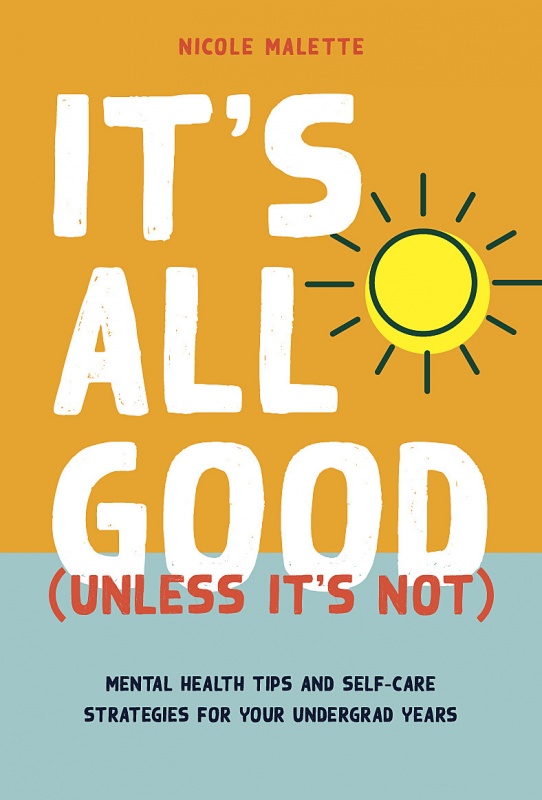Looking for a book recommendation? Look no further than It’s All Good (Unless It’s Not): Mental Health Tips and Self-Care Strategies. If you’re a post-secondary or senior year student, especially one in or about to be in the “important to the academic mission” culture of UW, this book is a must-read.
Nicole Malette, author and PhD candidate at UBC, has outdone herself with her debut book. It’s All Good… reads less like the technical manual the title suggests it is and more like a written conversation between the reader and someone who has been in the struggling student tunnel and has found a way out.
Throughout the book, Malette weighs in on her own personal experiences on campus as a student dealing with mental health challenges. Her ability to talk about her experiences brings much-needed comfort and delicacy to the discussion of mental health. Furthermore, it adds to her credibility as someone who can help the reader benefit and grow from whatever struggles they are going through. Malette brings in expert advice and statistics to back her guidance, as well as excerpts from students detailing their struggles with caring for their mental health while dealing with the stressors of balancing study, work, and life as a university student.
It’s All Good… goes beyond self-care habits that are glorified on social media: unplugging, drinking eight or more glasses of water, bubble baths, “follow this page,” etc. Mind you, the aforementioned are good tactics, aside from following yet another Instagram account. However, they are superficial and don’t elaborate on the benefits reaped. Malette presents different self-care and mental wellness strategies while exploring the “why” and “how” of it all. Malette also suggests ways to integrate those strategies into a busy schedule. For example, Malette endorses the idea of writing down two things you are grateful for a day, instead of just “journaling” or “practice gratitude.”
Another thing It’s All Good… does well is taking into account and catering to the various university experiences one may have depending on their situation. The voices of students featured in excerpts include, to name a few: BIPOC, LQBTQIA+, first-generation university students, international and domestic students, a commuter, and someone who switched their majors. Malette also provides scenarios that are bound to happen in student-life (talking to your parents about grades, sex, party culture, study habits, speaking to faculty) and endorses feasible ways to navigate and handle those situations, without compromising your mental wellbeing.
Malette’s writing style is simple yet eloquent. Although Malette is a PhD candidate, this book is an easy and engaging read, unlike the assigned journal articles for your courses. It’s written in a way that speaks to high schoolers and undergrads who may or may not be avid readers: informative, but without the scientific jargon of a PSYCH 101 module. The key to having good mental health is understanding what mental health is, and Malette does just that. The book is sandwiched by an introduction stating the importance of mental wellbeing and a conclusion to recapitulate the key takeaways from the book’s 120 pages. Each chapter also has a short introduction of its own to prime the reader for what they are about to learn. Malette also uses bullet points appropriately to add to the functionality of the book as a guide or manual, as opposed to a piece of scientific literature.
It’s All Good (Unless It’s Not): Mental Health Tips and Self-Care Strategies was a Sunday afternoon therapy session I didn’t know I needed. Although it doesn’t contain the “magic solution” to mental illness, it covers all of the different situations and scenarios that may be detrimental to a student’s mental health, whether they are starting the transition to university, managing the first few years in undergrad, or even applying for grad school. It’s All Good… is a great weekend read to unwind, understand yourself better, and plan for better days to come.
Rating: 5/5 stars































